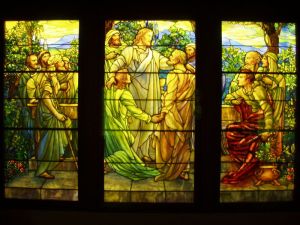I've covered the same ground before, but the mistaken conflation of "Sodom" and "homosexuality" is so commonplace, with such appalling results in providing a pseudo religious cover bigotry, gay-bashing and even homicide, that it deserves to be repeated as often as possible until the message sinks in. The story of Sodom has nothing to do with loving homosexual relationships. The "sin of Sodom" is not homosexuality, but the refusal of hospitality and kindness to strangers. Those guilty of the sin of Sodom are not "homosexuals", but the homophobes who persecute them.
There have been many good rebuttals of the standard, misguided misinterpertation. This exposition of it is from theologian and ordainied minister, Rev Patrick Cheng, at Huffington Post. In it, he shows how the words of the Hebrew text have here been misrepresented as referring to "having sex with", rather than the actual act, which was gang rape, a different matter entirely. He also shows how the Bible itself, in otehr passages, quite explicitly describes the "sin of Sodom" in terms which have nothing to do with homoerotic relationships, but are rather concerned with radical inhospitality.
He reminds us too, that responsible Biblical interpretation must go well beyond simply looking at the bare words (in translation) on the page, but must also consider the historical and social context. In Catholic theology, the Pontifical Bible Commission says also that we need to consider always the Bible as a whole, and not just isolated passages. Looking at the context, Rev Cheng shows just why absolute observance of hospitality to travellers and strangers was so important in the Jewish desert environment, and how the theme continues in the New Testament. (Indeed, one could argue that it is the supreme commandment of the Christian Gospels). Following this reasoning, he concludes that it is those who refuse to extend hospitality and inclusion to "homosexual" are those who are truly guilty of the sin of Sodom.
What Was the Real Sin of Sodom?
To many anti-gay Christians, I'm nothing more than a "sodomite" who is damned for all eternity. It doesn't matter that I've spent the last decade immersed in the Bible, ancient biblical languages, and the Christian theological tradition. It doesn't matter that I've dedicated my life to preaching, teaching, and ministering to all people, including the lesbian, gay, bisexual, and transgender (LGBT) community. The simple fact that I'm an openly gay man makes all of that irrelevant. To anti-gay Christians, God's destruction of Sodom and Gomorrah in chapter 19 of the Book of Genesis is a warning to people like me.
Ironically, I believe that these anti-gay Christians actually have it backwards. The true sin of the Sodomites as described in the Bible has nothing to do with same-sex acts per se. Rather, the ancient Sodomites were punished by God for far greater sins: for attempted gang rape, for mob violence, and for turning their backs on strangers and the needy who were in their midst. In other words, the real sin of Sodom was radical inhospitality. And, ironically, it is often anti-gay Christians who are most guilty of this sin today.
........
So, who are the real Sodomites today? Who are the people who turn their backs on the strangers and the least among us? Ironically, I believe that anti-gay Christians are often the ones who are most guilty of committing the true sin of Sodom. These include the Roman Catholic cardinals and bishops who are trying to scapegoat LGBT people for the horrific crimes of child rape that were committed by their brother priests. These also include the Mormon leaders who are secretly funding campaigns to fight marriage equality for LGBT people, despite the fact that their founders practiced polygamy. Finally, these include anti-gay politicians and self-appointed "family values" advocates who insist that LGBT people are categorically unfit to serve as parents or judges (because they are sinners and morally flawed), but are too blind to see their own sins and moral flaws.
The bottom line is that nowhere in the Bible does Jesus Christ ever condemn LGBT people. However, Jesus does expressly condemn people who turn their backs on strangers and on those who are the neediest among us. In the Gospel according to Matthew, Jesus says that whoever fails to welcome such people has failed to welcome Jesus himself (Matthew 25:43). In my view, the anti-gay religious leaders, politicians, and "family values" advocates who turn their backs on LGBT people should spend far less time obsessing about LGBT people and far more time thinking about the true sin of Sodom: radical inhospitality.
(Read the full article)
See also previous posts at Queer Scripture:
Books:
Boswell, John: Christianity, Social Tolerance, and Homosexuality: Gay People in Western Europe from the Beginning of the Christian Era to the Fourteenth Century
Countryman, William L: Dirt, Greed, and Sex: Sexual Ethics in the New Testament and Their Implications for Today
Helminiak, Daniel: What the Bible Really Says About Homosexuality
Rogers, Jack Bartlett: What the Bible Really Says About Homosexuality

